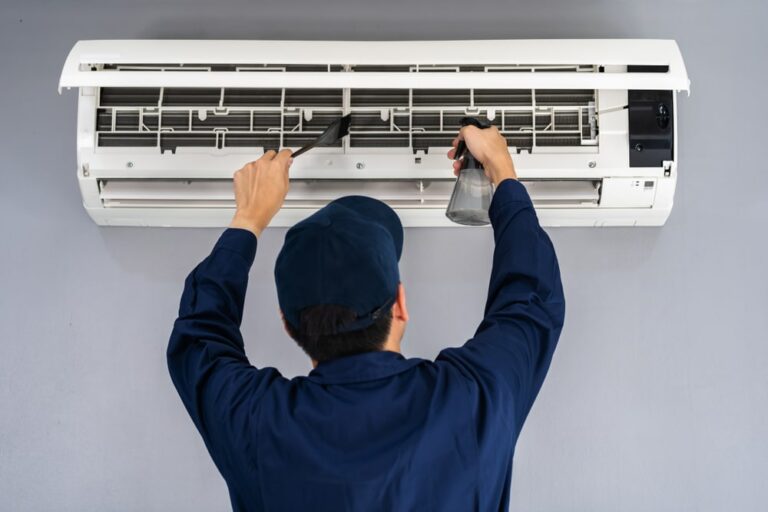Hey guys, I’m back with another article about something I see every single day on service calls. So here’s the deal. I’ve been fixing air conditioners for years now, and I keep a detailed log of every single house I visit and what I fixed while I was there.
Last summer alone, I had hundreds of AC service calls. Hundreds. And the thing is, a lot of these problems could have been caught earlier if homeowners knew what to look for.
I’ve gone through my service logs and pulled out the most common warning signs that your AC is about to give you trouble. These are the things I see over and over again where people wait too long and end up with a much bigger problem than they needed to have.
So I’m sharing these with you today because, honestly, catching these issues early can save you a ton of money and keep you from sweating through those hot summer nights when your AC decides to quit at the worst possible time.
8 Reasons Your AC Needs Attention
Look, your air conditioner is probably one of the hardest working appliances in your home during summer. It runs for hours on end, day after day. But unlike your refrigerator or washing machine, people don’t always notice when it starts acting up.
The signs can be subtle at first. A little less cooling here, a weird noise there. But these little signs are your AC basically screaming for help before it completely breaks down.
I’ve put together the top 8 warning signs I see most often in my service calls. If you notice any of these, don’t ignore them. Trust me, I’ve seen too many small issues turn into expensive repairs because people waited too long.
Weak or Limited Airflow
Weak airflow is probably one of the first things you’ll notice when your AC starts having problems. You put your hand up to the vent and barely feel anything coming out.
This happens all the time. I was at a house last week where the lady said her upstairs was roasting but the AC was running constantly. When I checked, there was hardly any air coming from the vents.
Usually, the culprit is a dirty air filter. I cannot tell you how many times I’ve pulled out filters that look like they’re growing a sweater. They’re supposed to be white, but I pull out these dark gray, furry-looking things.
Another common cause is duct issues or a failing blower motor. Sometimes the fan in your air handler just wears out over time and can’t push that air like it used to.
If you’re experiencing weak airflow and changing the filter doesn’t fix it, seeking professional guidance from HVAC in Chicagoland can offer valuable solutions before the problem gets worse.
Warm Air Coming Out
This one drives people crazy. Your AC is running, you hear it, your electric bill shows it, but warm air is coming out of the vents. Talk about frustrating.
In my experience, this usually comes down to a few things. First, check your thermostat. Make sure it’s actually set to cool mode. You’d be surprised how many service calls I go on where someone accidentally hit the wrong button.
If that’s not it, you’re probably low on refrigerant. Remember, an AC is a sealed system. If you’re low on refrigerant, that means you have a leak somewhere. That refrigerant doesn’t just disappear on its own.
I had a customer last month who kept having companies come out to “top off” his refrigerant every summer. Nobody bothered to tell him he had a leak that needed fixing. He probably spent enough on refrigerant over the years to buy a whole new system.
Another possibility is a compressor issue. The compressor is like the heart of your AC system. If it’s not working right, your system might run but won’t cool properly.
Strange Noises During Operation
Your AC should not sound like it’s about to launch into space. If it’s making weird noises, something’s wrong.
Squealing usually means a belt issue or bad motor bearings. Grinding or metal-on-metal sounds can indicate a serious compressor problem. Rattling often means something is loose or a part has broken inside.
Just last summer, I had a call where the homeowner said her AC sounded like someone was shaking a coffee can full of bolts. Turned out a fan blade had broken and was bouncing around inside the condenser unit. Five minutes and one replacement blade later, problem solved.
But not all noises are that easy to fix. Hissing or bubbling sounds could mean refrigerant leaks, which is more serious.
Bottom line, if your AC starts making noises it didn’t make before, don’t just turn up the TV to drown it out. That’s like ignoring the check engine light on your car. It won’t end well.
Unusual or Foul Odors
AC systems shouldn’t smell. Period. If yours does, something’s wrong.
A musty smell usually means you’ve got mold or mildew growing somewhere in the system. This happens a lot in humid climates. The moisture builds up in your system and creates a nice home for mold.
A burning smell is more serious. This could mean an electrical component is overheating or burning out. If you smell something burning, shut your system off right away and call someone.
One of the strangest calls I had was a system that smelled like dirty socks. The homeowner was embarrassed, thinking something was wrong with their house. Turns out it was bacteria growing on a dirty evaporator coil. A good cleaning solved the problem.
Some smells are just annoying, but others can actually affect your health, especially if you have allergies or respiratory issues. Don’t ignore them.
Frequent Cycling On and Off
An AC that constantly turns on and off isn’t just annoying – it’s inefficient and hard on your system.
Normal cycling depends on the outside temperature, but your AC should run for at least 15-20 minutes once it turns on. If it’s running for just a few minutes, shutting off, then turning back on again shortly after, that’s called short cycling.
This can happen for several reasons. Your system might be oversized for your home. A lot of people think bigger is better with ACs, but that’s not true. If it’s too powerful, it cools too quickly and shuts off before properly dehumidifying your home.
Other causes include refrigerant issues, dirty filters restricting airflow, or even a faulty thermostat.
I once fixed a system that was cycling on and off every 3-4 minutes. The homeowner had replaced her thermostat herself but mounted it right next to a heat register. Every time the AC would run, cold air would hit the thermostat, making it think the whole house was cool. Then it would shut off, warm up from the nearby kitchen, and kick back on again. Moving the thermostat fixed everything.
High Humidity Indoors
Your air conditioner doesn’t just cool your home – it dehumidifies it too. If you’re feeling sticky inside even with the AC running, something’s not right.
I see this a lot in older systems or systems that aren’t sized properly. The AC needs to run long enough to pull moisture out of the air. If it’s short cycling or not working efficiently, you end up with a cool but humid house.
You might notice condensation on windows, a damp feeling in the air, or even mold starting to grow in certain areas. These are all signs your AC isn’t managing humidity properly.
Sometimes the fix is simple, like adjusting fan speeds. Other times, you might need repairs or even consider a dedicated dehumidifier to work alongside your AC.
Rising Energy Bills
I always tell people to watch their electric bills during cooling season. A sudden spike can tell you something’s wrong with your AC long before you notice performance issues.
As systems age or develop problems, they have to work harder to produce the same cooling. This shows up on your electric bill before you might feel it in comfort.
Common causes include dirty coils, refrigerant leaks, duct leaks, or simply an aging system that’s losing efficiency.
I had a customer whose bill doubled in one month. We found that their outdoor unit was completely clogged with cottonwood fluff. The system was working overtime trying to release heat through coils that were basically insulated with plant material. A good cleaning and their bills went right back to normal.
Water Leaks or Ice Build-Up
Water around your indoor unit or ice on the refrigerant lines are classic signs of trouble.
A properly working AC should not leak water indoors, period. If you see water, you likely have a clogged condensate drain line. This is actually one of the most common calls I get in summer.
Your AC produces condensation as it cools, just like a cold drink gets water droplets on the outside on a hot day. This water needs somewhere to go. If the drain line gets clogged with dust, algae, or mold, that water backs up and spills out.
Ice on your refrigerant lines or indoor coil almost always means airflow problems or low refrigerant. Either way, it’s bad news. Your system can’t work properly with ice built up, and continuing to run it can damage your compressor.
I once went to a house where the homeowner had been mopping up water around their air handler for weeks. By the time I got there, the water had damaged their flooring and they had mold growing in the walls. A simple drain cleaner could have prevented thousands in repairs if they’d called sooner.
Conclusion
Listen, your AC will usually give you plenty of warning signs before it completely breaks down. The key is knowing what to look for and not ignoring these signs when they show up.
I’ve seen too many small, inexpensive fixes turn into major, costly repairs because people waited too long to call someone. That strange noise doesn’t just go away on its own.
That small water leak doesn’t fix itself.
The best thing you can do for your AC is change your filters regularly and get a tune-up once a year, preferably in spring before the heavy use season starts. This catches a lot of issues while they’re still small.
If you notice any of these eight warning signs, don’t put off getting help. The longer you wait, the worse it usually gets, and the more likely you’ll end up hot and uncomfortable on the hottest day of the year when home service are booked solid.
Take it from someone who’s seen it all – a little prevention and early attention goes a long way with air conditioners. Your future self will thank you when you’re staying cool while your neighbor is on a waiting list for emergency service.



